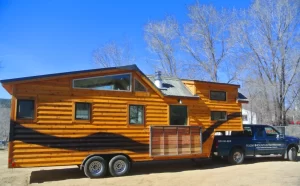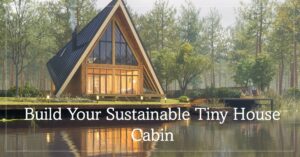Tiny House Trailer Options: How To Choose The Right One For You
In recent years, the Tiny House Movement has gained significant traction, captivating the imagination of those seeking a simpler, more sustainable lifestyle. At the heart of this movement lies a pivotal element—the tiny house trailer.
It’s a foundation on wheels, enabling individuals to turn their dreams of mobility and minimalist living into a reality.
However, the reasons behind searching for the perfect tiny house trailer are as diverse as the movement itself. In this article, we’ll delve into the intricacies of these searches, uncovering the underlying motivations that drive individuals to explore tiny house trailer options.
Planning to Build a Tiny House
For many, the desire to build a tiny house represents a profound shift in lifestyle, one that embraces minimalism and sustainability. The intent behind their search for the right trailer is to find a foundation that aligns perfectly with their vision.
Example: Meet Sarah, an environmentalist who dreams of living off-grid in a cozy tiny house. She envisions a life with a significantly reduced carbon footprint. Her commitment to environmental sustainability drives her search for a suitable tiny house trailer. Sarah wants a trailer that allows her to harness solar energy efficiently and collect rainwater for everyday use.
Researching Tiny House Trailer Types
The quest for the ideal tiny house trailer often begins with exploring various trailer types. Each type offers unique advantages and disadvantages, making it essential for searchers to match their choice to their intended lifestyle.
There are different types of tiny house trailers, such as flatbed, gooseneck, bumper pull, and drop axle. Each type has its own advantages and disadvantages, such as stability, maneuverability, and cost.
Here is a comparison table of the different types of tiny house trailers:
| Type | Description | Pros | Cons |
|---|---|---|---|
| Flatbed | A flat and level trailer with no sides or rails | Easy to build on, versatile, affordable | Less stable, more sway, lower clearance |
| Gooseneck | A trailer with a raised section that attaches to the bed of a truck | More stable, less sway, more storage space | More expensive, harder to maneuver, requires a special truck |
| Bumper pull | A trailer that attaches to the bumper of a vehicle | Easier to maneuver, compatible with most vehicles, more aerodynamic | Less stable, more sway, less storage space |
| Drop axle | A trailer with axles that are lower than the frame | More clearance, more headroom, more stability | More expensive, harder to find, more maintenance |

Example: David is a freelance photographer who loves to travel and capture the beauty of nature. He plans to build a mobile tiny house studio that will take him to breathtaking landscapes for his work. David’s search for tiny house trailer options is centered on finding a gooseneck trailer. This type provides extra space for his photography equipment and offers more excellent stability on the road, which is crucial for maintaining the integrity of his work.
Budget Considerations
Budget constraints play a significant role in determining the type of tiny house trailer one can afford. The intent here is straightforward: find a trailer that meets the requirements and fits within the financial plan.
Example: Michael and Lisa are a young couple with a modest budget, eager to downsize and reduce their living expenses. Their search for a tiny house trailer focuses on affordability. They are willing to compromise in size and features to ensure that their tiny house project remains cost-effective.
Size and Weight Specifications
Tiny house enthusiasts must adhere to specific size and weight limits to comply with road regulations and safety standards. This search aims to ensure that the chosen trailer is a safe and legal option for their tiny house.
Example: John is a retired teacher who plans to spend his golden years exploring the country in his custom-built tiny house. He knows that exceeding weight limits can lead to safety hazards and legal issues. John carefully researches tiny house trailer options to find one that perfectly accommodates his retirement dream without compromising safety.
Mobility and Lifestyle Choices
A significant portion of the tiny house community is drawn to mobility. The intent here is to discover a trailer that enables them to embrace a nomadic lifestyle or be free to move whenever they desire.
Example: Emma is a digital nomad who works remotely and loves to explore new places. Her desire for freedom and adventure motivates her search for the right tiny house trailer. She envisions a life where she can wake up to a new view outside her window each day, making mobility a top priority in her search.
Quality and Durability
The foundation of a tiny house must be sturdy and durable to withstand travel and exposure to the elements. Searchers are motivated by the intent to find a trailer that can serve as a reliable home for years to come.
Example: Mark and Jenny are a couple who plan to build their tiny house in a climate with harsh winters. They are searching for a well-insulated and structurally sound trailer to ensure comfort and safety during the colder months. They intend to invest in a high-quality trailer that can endure changing weather conditions.
Environmental and Sustainable Options
As sustainability gains importance globally, many individuals are motivated by the intent to find eco-friendly and sustainable trailer options that align with their values.
Example: Rachel advocates for sustainable living and intends to build an eco-friendly tiny house. Her search for a tiny house trailer revolves around finding one made from recycled materials and designed with energy-efficient features. Her ultimate goal is to create a tiny home that has a minimal impact on the environment.
Local Regulations and Compliance
Navigating local building codes and zoning laws is essential to the tiny house journey. Searchers are motivated to find trailers that comply with these regulations, ensuring a smooth process when setting up their tiny houses.
Example: Tom and Laura are a couple planning to build a tiny house in a rural area with specific zoning regulations. Their intent behind searching for a tiny house trailer is to find one that adheres to these regulations, eliminating potential legal hurdles and ensuring a hassle-free transition to tiny house living.
Customization and Features
Each individual’s tiny house vision is unique, often leading to the intent to customize their chosen trailer with specific features that enhance their lifestyle and comfort.
Example: Alex is an artist who plans to use their tiny house as a living space and a mobile studio. Their search for a tiny house trailer focuses on customization options, such as extra storage compartments and built-in workspaces, to accommodate their creative needs and ensure maximum functionality.
Comparing Prices and Reviews
Informed decision-making is crucial when it comes to purchasing a tiny house trailer. Searchers are motivated to gather pricing information, read reviews, and seek recommendations from others who have embarked on this journey.
Example: Chris is a meticulous researcher who believes in thorough due diligence. Before investing in a tiny house trailer, they spend weeks comparing prices, reading user reviews, and joining online forums to gather insights from experienced tiny house dwellers. Chris intends to make a well-informed decision based on the experiences of others.
Final Thoughts on Choosing a Tiny House Trailer
The motivations driving individuals to search for tiny house trailer options are as varied as the tiny house movement.
Whether it’s a quest for sustainability, a commitment to mobility, a focus on budget, or a desire for customization, understanding the searcher’s intent is key to finding the perfect foundation for their tiny house dream.
In a world where the search for simplicity and sustainability collides with the need for mobility and functionality, the tiny house trailer becomes the vessel that transforms intentions into reality.

